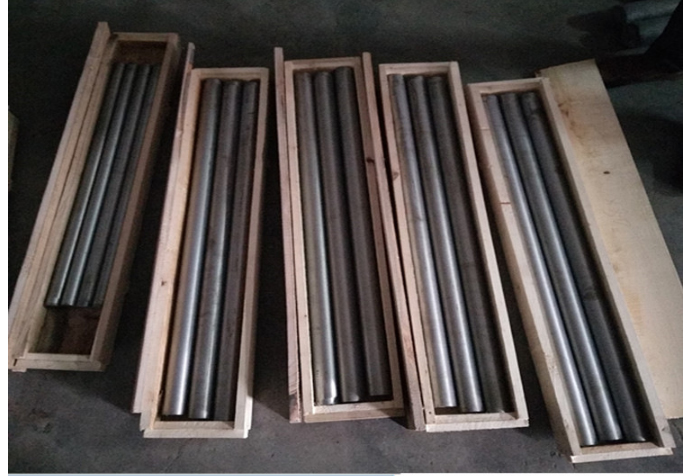molybdenum electrode
Refractory molybdenum is a material used for specific electrodes and is
indispensable in industry. With their help, you can weld unexpected
combinations of metals and alloys with minimal consumption of electrode materials.
Using them, you can create the most uniform seams without the need for
further processing with abrasives. The possibility of defect formation is also
minimized, therefore, under certain technical conditions, no joint
inspection is required.
Molybdenum electrodes are also used for welding glass and basalt. Their
main feature is that the glass from the melt does not adhere to the
surface. At the "MetallKomplekt" company, you can buy molybdenum electrodes
manufactured in strict accordance with the GOST standard. When used
according to guaranteed technical specifications and application conditions, they can
provide reliable and predictable output results.
Metal welding electrode
All refractory metals are used to produce specific welding accessories
or consumables. Molybdenum electrodes are rarely used for these purposes
because
their tungsten analogues are more common. Some alloys cannot be welded
with W-type electrodes.
Glass melting electrode
In this process, the molybdenum electrode only serves as a thermal
conductor with an inert surface. With their help, they just need to pass
between two
glass products and then squeeze them firmly.
General advantages of molybdenum electrodes
Compared with other electrodes in their application fields, they have
many advantages:
Metals have high elasticity, so with their help, you can press on the
glass to form various seams. Molybdenum electrodes maintain their
strength when the
glass melts.
The unique thermal conductivity of molybdenum allows you to always keep
the device in a high degree of use. From the moment the welding machine
was
turned on, a few seconds had passed before the process began.
Weak thermal expansion. This way, you can create high-precision seams
with constant geometric parameters over the entire length.
With their help, you can weld various colors of glass, the molten glass
will become an aggressive environment. At the same time, the molybdenum
electrode
does not affect the transparency.
If necessary, this electrode is very suitable for machining.
.
.
;
.
molybdenum
Cobalt
Iron
Carbon
Sulfur
Copper
Zinc
Lead
Total Impurities
99.99
<0.00002
0.002
<0.01
0.0002
0.00005
0.00005
0.00002
<0.01
Diam
thickness
length
width
purity
Details

Foil
0.03mm -0.8mm
>3000mm
2mm-150mm
99.99%
Details

sheet
0.03mm-50mm
100mm
100mm
99.99%
Details

wire
0.025mm
-0.05mm
7000-8000m
99.99%
Details

Stab
2.0mm
-150mm
<1000mm
99.99%
Details

powder
50nm- 20μm
99.99%
Details

Pellets
6mm-13mm
99.99%
Details

granules
6mm-13mm
99.99%
Details

Sputter
target
3mm-300mm
O30--2000mm
99.99%
Details

crucible
30ml-50ml
99.9%
Details

mesh
0.05-2mm
hole:0.3X0.6mm, 0.5X1mm
............20X40mm
99.9%
Details
Refractory molybdenum is a material used for specific electrodes and is
indispensable in industry. With their help, you can weld unexpected
combinations of metals and alloys with minimal consumption of electrode materials.
Using them, you can create the most uniform seams without the need for
further processing with abrasives. The possibility of defect formation is also
minimized, therefore, under certain technical conditions, no joint
inspection is required.
Molybdenum electrodes are also used for welding glass and basalt. Their
main feature is that the glass from the melt does not adhere to the
surface. At the "MetallKomplekt" company, you can buy molybdenum electrodes
manufactured in strict accordance with the GOST standard. When used
according to guaranteed technical specifications and application conditions, they can
provide reliable and predictable output results.
Metal welding electrode
All refractory metals are used to produce specific welding accessories
or consumables. Molybdenum electrodes are rarely used for these purposes
because
their tungsten analogues are more common. Some alloys cannot be welded
with W-type electrodes.
Glass melting electrode
In this process, the molybdenum electrode only serves as a thermal
conductor with an inert surface. With their help, they just need to pass
between two
glass products and then squeeze them firmly.
General advantages of molybdenum electrodes
Compared with other electrodes in their application fields, they have
many advantages:
Metals have high elasticity, so with their help, you can press on the
glass to form various seams. Molybdenum electrodes maintain their
strength when the
glass melts.
The unique thermal conductivity of molybdenum allows you to always keep
the device in a high degree of use. From the moment the welding machine
was
turned on, a few seconds had passed before the process began.
Weak thermal expansion. This way, you can create high-precision seams
with constant geometric parameters over the entire length.
With their help, you can weld various colors of glass, the molten glass
will become an aggressive environment. At the same time, the molybdenum
electrode
does not affect the transparency.
If necessary, this electrode is very suitable for machining.
.
.
;
.
| molybdenum | Cobalt | Iron | Carbon | Sulfur | Copper | Zinc | Lead | Total Impurities | ||
|---|---|---|---|---|---|---|---|---|---|---|
| 99.99 | <0.00002 | 0.002 | <0.01 | 0.0002 | 0.00005 | 0.00005 | 0.00002 | <0.01 |
| Diam | thickness | length | width | purity | Details | ||
|---|---|---|---|---|---|---|---|
 |
Foil | 0.03mm -0.8mm | >3000mm | 2mm-150mm | 99.99% | Details | |
 |
sheet | 0.03mm-50mm | 100mm | 100mm | 99.99% | Details | |
 |
wire | 0.025mm -0.05mm |
7000-8000m | 99.99% | Details | ||
 |
Stab | 2.0mm -150mm |
<1000mm | 99.99% | Details | ||
 |
powder | 50nm- 20μm | 99.99% | Details | |||
 |
Pellets | 6mm-13mm | 99.99% | Details | |||
 |
granules | 6mm-13mm | 99.99% | Details | |||
 |
Sputter target |
3mm-300mm | O30--2000mm | 99.99% | Details | ||
 |
crucible | 30ml-50ml | 99.9% | Details | |||
 |
mesh | 0.05-2mm | hole:0.3X0.6mm, 0.5X1mm ............20X40mm |
99.9% | Details | ||
